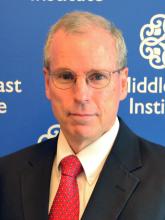In this week's Monday Briefing, MEI experts Robert S. Ford, Paul Scham, and Marvin G. Weinbaum provide analysis on recent events including the battle against ISIS for Fallujah, Israel's upcoming address to the EU Parliament, and Pakistan's upcoming accession to the Shanghai Cooperation Organization.
ISIS to Lose Fallujah
Robert S. Ford, Senior Fellow
Iraqi government forces seized most of Fallujah during the past week, including the government complex in the center of the city. Fierce house-to-house fighting continues in parts of the city, but the Islamic State will lose Fallujah, a significant blow to its prestige.
Militarily, Iraqi security forces, led by counter-terrorism and federal police units, performed well with close combat air support from the international coalition. Shiite militias also supported the operation by securing rear areas. Over the past two weeks, Shiite militias funded by Iran detained and killed some men fleeing the city. The Anbar governor on June 12 issued a statement saying there was evidence that the militias had killed 49 civilians while another 643 were missing. Prime Minister Haider al-Abadi said a commission would investigate. Abadi has minimal leverage over these Iranian-backed militias, so if anyone is actually held accountable, it would indicate Abadi’s rising political weight. Moreover, restraining sectarian revenge killing would help restrain extremist recruiting as the Iraqi local and national governments struggle to restore stability and security in Sunni Arab communities.
The huge flow of refugees out of Fallujah, 30,000 civilians between June 16 and 18 alone, overwhelmed Iraqi government and international organization facilities established to receive them. As Iraqi officials and their international allies look ahead to Mosul, a much larger city, they will have to reconsider the scale of humanitarian relief facilities needed there. In addition, there will be the longer-term reconstruction challenge as the successful military operations have left cities like Ramadi and Fallujah devastated while Baghdad faces major budget constraints.
Rivlin, Abbas to Address EU Parliament
Paul Scham, MEI Scholar
Israel appears to be finally taking the ‘French initiative’ to end the Israeli-Palestinian conflict seriously, which the European Union’s Foreign Affairs Council is expected to endorse on Monday. The plan includes requiring Israeli and Palestinian participation in a peace conference before the end of this year, and rigid deadlines culminating in a Palestinian state. This comes as Israeli President Reuven Rivlin prepares to address the European parliament on Tuesday, followed by Palestinian President Mahmoud Abbas on Thursday.
Israel has expressed strong opposition to the French plan, which is based on the Arab Peace Initiative (A.P.I.) first formulated in 2002. Israel has lately expressed hope for an alternative peace process based on agreements with regional states, although Arab countries have unanimously insisted that acceptance of the A.P.I. is a precondition for any agreement. Israeli Prime Minister Netanyahu has repeated that Israel will not accept the A.P.I. without considerable alterations, something the Arab states, individually and collectively, have steadfastly refused.
Israeli diplomats are hoping to water down the French plan, but there seems little chance of that happening. President Rivlin can be expected to convey Israeli opposition while President Abbas has already expressed strong support for it. Meanwhile, Netanyahu is hoping to meet with Secretary of State John Kerry in Europe this week in an attempt to get the United States to oppose or at least modify the plan. As of yet, the United States appears to be supporting it.
Pakistan to Become Full Member of S.C.O.
Marvin G. Weinbaum, Director of the Center for Pakistan Studies
Pakistan will be admitted as a full member state of the Shanghai Cooperation Organization (S.C.O.) following the group’s summit this Thursday and Friday in Tashkent. Having served as an observer to the S.C.O. for years, the decision to afford Pakistan full membership was announced at last year’s July summit in Ufa, Russia.
Pakistan’s promotion to full membership does not represent a significant change in the geopolitical sphere, but rather signifies its continuing desire to have options other than the United States and to diversify its alliances so as to demonstrate its ability to operate without U.S. intervention. Attaining membership will allow Pakistan to strengthen its role as a major regional player in economic and military matters and to increase its growing ties with China.
The S.C.O. also announced last year India’s promotion to member state, though China has delayed the process by raising concerns about India’s involvement. Russia and Kazakhstan, however, have expressed support for India as they stand to benefit from India’s participation. S.C.O. Secretary-General Rashid Alimov stated last week that India would attain full membership within the year. The dual inclusion of India and Pakistan lessens the impact of the decision, particularly in regards to the oft-tense relationship between the nations.
Pakistan’s forthcoming status as member state will afford new opportunities and allow for new objectives, but is in itself not a grand change in affairs. The decision simply reemphasizes what they have come to value, in particular their growing relationship with China and rise as a geostrategic player.
The Middle East Institute (MEI) is an independent, non-partisan, non-for-profit, educational organization. It does not engage in advocacy and its scholars’ opinions are their own. MEI welcomes financial donations, but retains sole editorial control over its work and its publications reflect only the authors’ views. For a listing of MEI donors, please click here.















